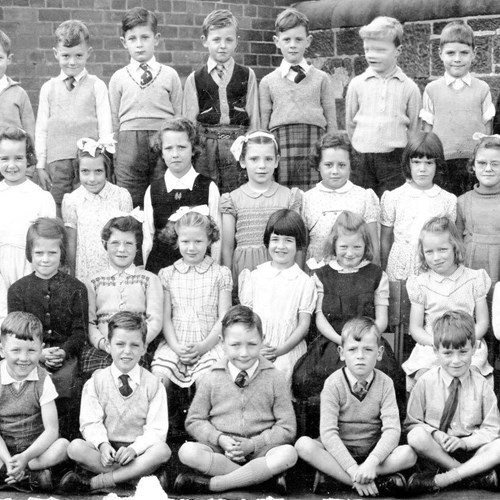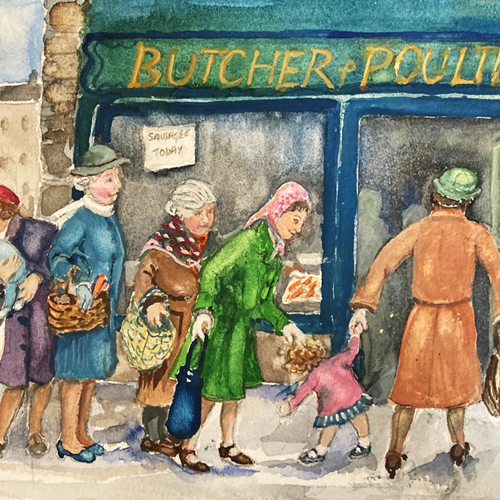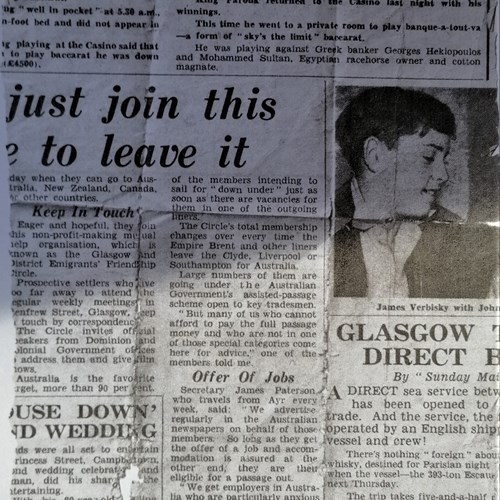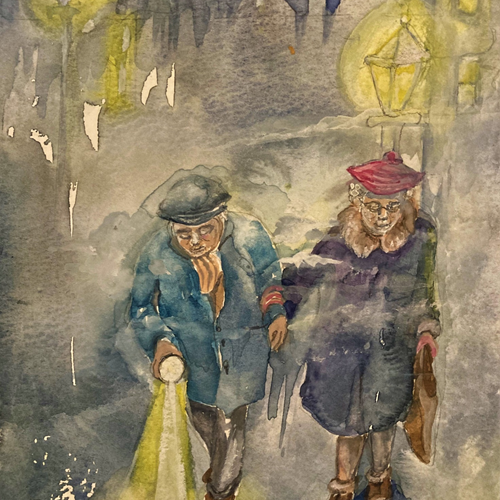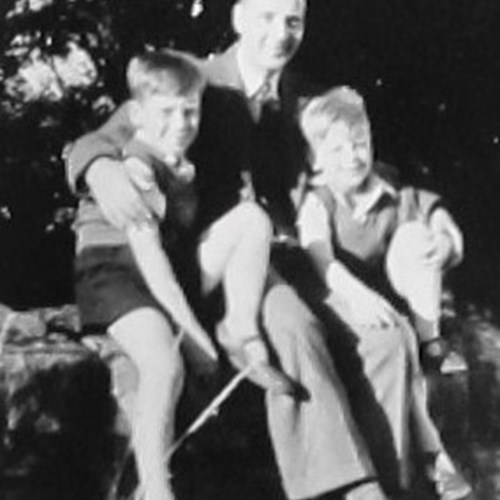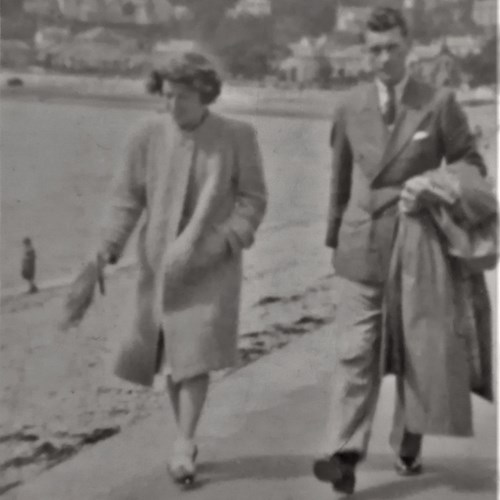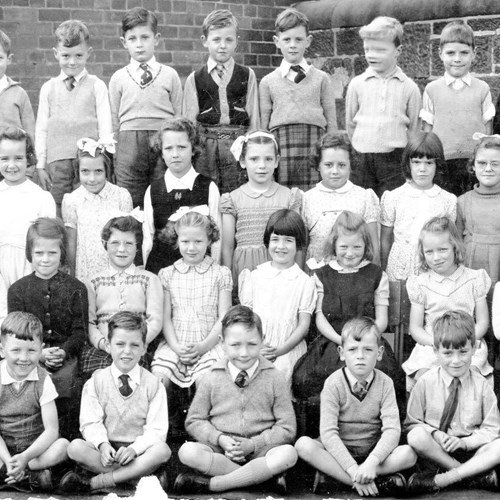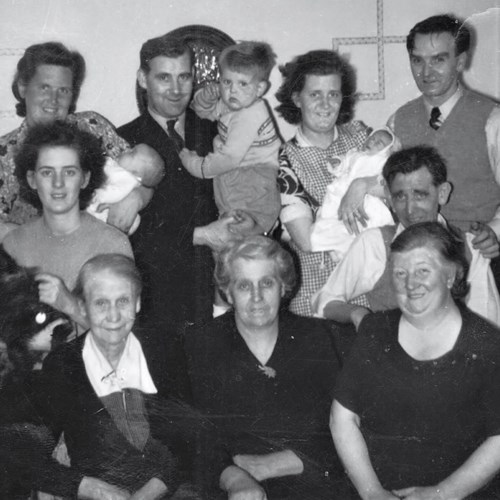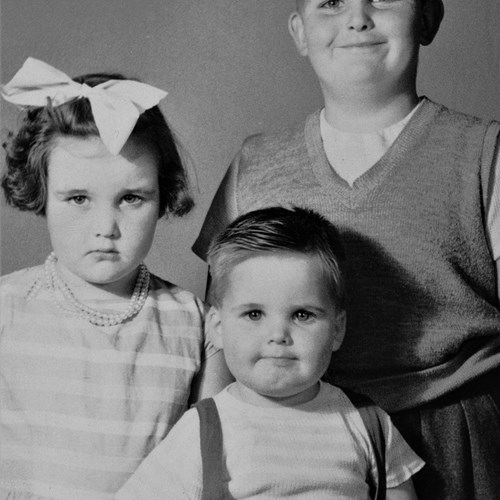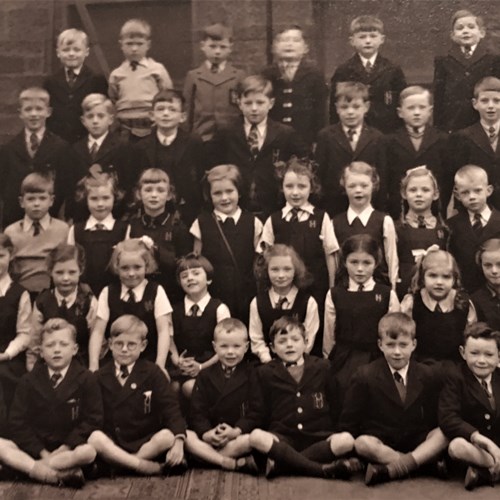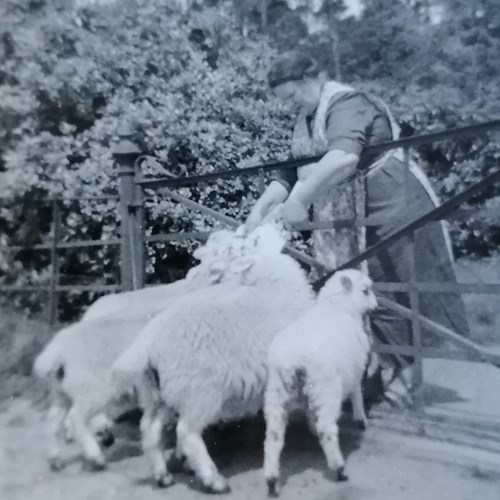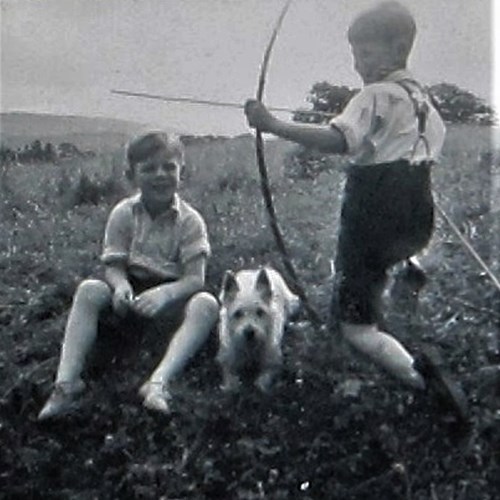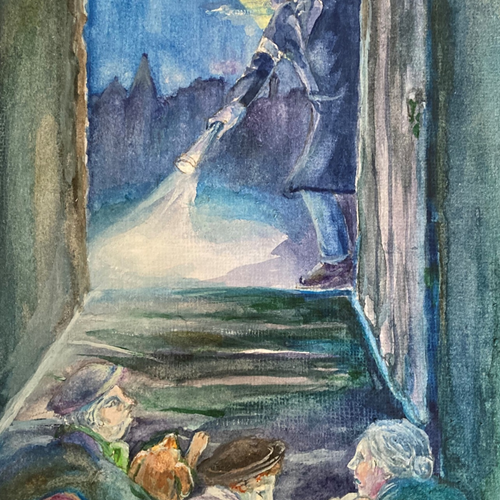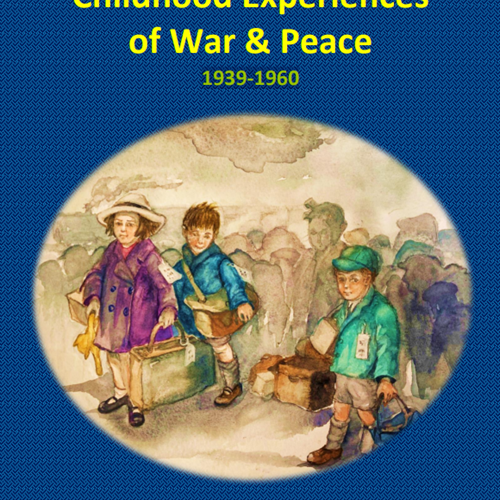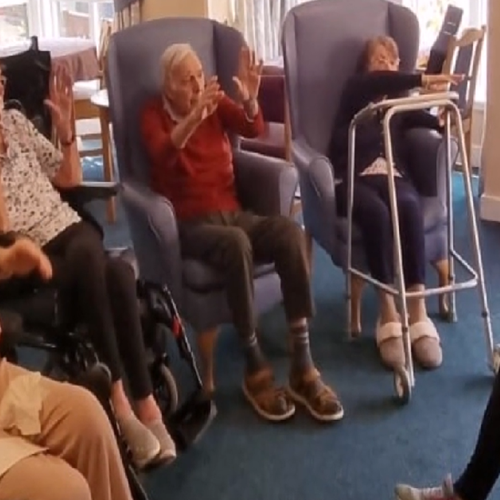I started off as a commis chef in the 101 Restaurant in Hope Street Glasgow. My Mother had to get a provident cheque. There were only certain shops that accepted them and the man used to come every week to take the money. You paid the man every week. It was like a loan, a cheque. Because nobody had bank accounts or bank books or any money to put in the banks. So she took me down to a shop called Dallas’s in the Cowcaddens to get my chef’s clothing. That’s my wee white jacket, my aprons and my checks and my chef’s hats. You had to buy your own what they call PPE nowadays, industrial clothing. You had to buy all that in those days. Nowadays they get it all given. it’s all part of the job. I was stuck in there for about six months. And my Uncle spoke for me and I got a job in Weir’s. Just going messages to the canteen and taking prints up to the drawing room to get photocopied and making the tea and all that. And then when I was 16 I started my apprenticeship as an apprentice fitter. Then I went back to cooking and that’s what I’ve been doing ever since.
Then I joined the Merchant Navy and I had 35 years at sea and that was an eye opener. I never dreamed in a million years when I was a wee boy from Glasgow with scuff marks on the back of my legs, from where my wellies used to rub, that I’d be lying on a beach in Bermuda, or anywhere else for that matter. I was round the world umpteen times. I wish I could do it all again and do it better.
Sandy Boyle, born 1948, brought up Maryhill
Well, I finished up as a P.A. Secretary in local government. I had been in other jobs before that, but I enjoyed what I was doing. I had aspirations of being a nurse, but my Mum really talked me out of it. She didn’t think I’d make a good nurse.
Grace Wilson Blair, born 1935, brought up in Shotts
I went to Rutland Road in Govan. Got interviewed by a fellow called Mac. And he was the head of the hire purchase department. The first day I went there, the following Monday, I think it was, I went down to the workshop at lunchtime to see Ellis who was repairing T.V.s and said ‘Ellis, I’ll never be able to thank you enough’. I just fell in love with it and for forty years I just stayed in what I suppose is Consumer Credit. Litigation, Data Protection Officer for the company.
Philip Cohen, born 1937, brought up in the Gorbals and then Shawlands
Going to sea and going to join that big ship at the tail of the bank. Huge big ship and twelve of us, twelve boys into this little launch at Gourock and steaming out towards this huge, big ship. I was in awe. To me it was a 25,000-tonne liner. Up the gangway, up to the deck and the Bosun said ‘Right who knows their international code?’ Me! ‘Who knows their morse code?’ Me! Then, ‘Who knows their signals?’ Me! So I was the first one to get picked to go as a bridge boy. I didn’t know what a bridge boy was. It sounded good and they wanted three. I can’t remember the other two boys. But we all slept in the same cabin and what have you. That to me was my greatest memory.
It was just something I wanted to do, I loved it, I really did. I liked my time. I was eight years at sea, and I loved every moment of it. I loved going away and then there was no communication, so people didn’t know when you were getting back. Because I wasn’t a good letter writer. But then none of us were and when you get home (knocks on table), ‘Oh, oh, you’re home. Oh, when’re ye going back?’ (laughs). You know that was the sort of thing. And when you were going away, ‘Oh, cheerio’, that was it, no hugging, loving, cuddly kisses, no tears, no farewells.
George Burns, born 1926, brought up in Bridgeton then Kinning Park
When I left school, I applied to study Radiography. So, I did that and I qualified as a Radiographer. And that then would give me all the opportunities I wanted, you know, I could work in Canada. My qualifications were recognised all over the world really. So, there was nothing to stop me going wherever I wanted. It was a fairly decent job which I enjoyed.
I left Scotland with a five-year plan. I was going to work in Toronto for six months. I was going to work in Vancouver for six months. I was going to work in San Francisco for six months. I was going to work in Australia for six months. I was going to work in New Zealand for six months. Then I was going to come back up from the South of India and take a trip back up through India and then back to Glasgow five years later. And that was my plan when I left home. And then I got stuck in Toronto for four years. I did travel all over Canada and America, but I worked in Toronto for four years.
I was 26/27 and I thought - I have to decide where I’m going to live. And in the end, I decided to come back to Scotland. I was an only child; my parents were getting older. I didn’t fancy being in Canada and having that long distance worrying about them and all that. So I decided to come back to Glasgow.
I was only going to come back for three months, and I was going to go to South Africa for a year or so before I finally came back to settle in Glasgow. So, I came back and went back to the Southern General to wish them all a Merry Christmas or Happy New Year or something. And they said !”Oh, do you want a job?” and I said I’m only back for three months for a holiday and then I might want a job after that. “You’re here for three months, please come and work for us we’re short staffed.” I said okay I’ll work for you for three months. So, I worked there for three months. But then I got a job with ‘NoOnCall’, and I decided to stay there, and I think when I left thirty-five years later, I think I was still on that three-month contract.
Marlene Barrie, born 1946, brought up in Scotstounhill and Blairdardie
After school I got a job as a Trainee Cost Accountant at British Polar Engines in Helen Street. But I used to come up north when I was at school from the age of 13, maybe. So, I used to come up north for eight weeks and stay with my Granny and Grandfather. And I loved it. And after working as a trainee cost accountant. I thought no, I’ll go up north as a trainee surveyor. But they were only going to pay me eighteen shillings a week and I couldn’t afford that. Because I’d to travel to Elgin which was twelve miles away and give my Granny and Granda some digs. So I decided I’m not going for it. So I became a labourer in the railway. And my Granda still worked at the same station where I was born. And I loved it. I was there for a year or two. And my Faither, he thought I was a trainee surveyor and I never told him. He only found out when he came up on holiday and I never knew he was coming. And his train carriage stopped at the Craig station and here’s me standing outside doing my porter bit. And this is when he first found out. After that, the station master at Craigellachie said you’re too good, so they sent me, I didn’t want to go, and I ended as a station master’s clerk in Elgin.
A boy came one time I was selling a ticket. He was in charge of the Hydro Board in Elgin, and he went to Bellahouston Academy. And he said, “Where do you come from with your accent?.” And he said, “Right, I’ll give you a job in the Hydro.” And then from there I went to an office in a distillery. And I ended up as distillery manager making the Famous Grouse at Tamdhu.
After that I bought a chip shop in Portsoy on the coast. And then I sold that and worked in a seafood factory in Buckie. And then before I was retired, for the last two years, I worked with young lasses in Asda.”
James Love, born 1943, brought up in Craigellachie and Glasgow
Radio officers are now extinct as you are probably aware. You go on a ship today and it’s just a satellite. There’s a golf ball above the bridge and that’s the satellite antennae. So, radio officers are no more. So, I was very happy that I was able to get under the wire, as it were, and do a job. Morse Code particularly. We used a lot of Morse Code. I pride myself I can still send and receive thirty, thirty-five words a minute without any problem. As I often do on the internet just for fun. I emigrated in 1963. I was in the Merchant Navy in 1960. I was with Union Castle Line South Africa, Cunard Line in the North Atlantic and some cargo ships. And then I decided that I better get a shore job. Because, you know, time was getting on. And pension and so forth. So I came ashore in the early sixties and I came to Canada. I went to college for a few months before I came to Canada. Came over here and I joined a large telecommunications company. I also went back to sea. I hadn’t quite wrung the salt water out of my socks as the saying goes. So I went back to sea for about 9 months in the early sixties. On an iron ore carrier down to South America. Being caught in a few Caribbean hurricanes. I had had enough after a year just about and I eventually came ashore for good.
Ian Coombe, born 1942, brought up Gosport, then Glasgow
You left school at fifteen, but you couldn’t start an apprenticeship until you were sixteen. So it was a year between there and I got a job on a building site, where they were building new houses out in the outskirts to Greenock, where we had now moved to. We had moved out of the tenement. We had moved out to an estate out in the sticks, and they were expanding it. And I got a job there making tea for the labourers. And it was there that I got a chance to see all the different trades in the building trade. And I decided that I would be a painter. So then when I got to sixteen there was an advert in the local paper for an apprenticeship as a decorator. And my father wrote the famous letter and I got the job. The unpleasant thing about that was at the same time as they told me after having got the job-it was my handwriting. And I explained that it wasn’t me who wrote it. And the other was there had been two of us on a short-list for the job but unfortunately the other boy was a Catholic. Even then I knew this is not right. This can’t be right and that’s away back in what, the ‘50, early ‘50s. It was a horrible thing you know, prejudices. I hate prejudices of any kind.
During your apprenticeship you could get your National Service postponed. So when I got to eighteen but still had another three years of an apprenticeship. Then they allowed you to carry on the apprenticeship. But as soon as that was finished you then had to go and do your National Service. But, as I say, by that officially it was finished and I thought, oh well that’s fine I’d got away with it. But no, they had a long memory and as soon as I was twenty-one, I got the notice that I had to go into the army which by that time I’d got married. Thinking, we thought well you don’t have to do this National Service. So, when I was twenty-one and my wife was twenty we got married and then the papers turned up and so I had to go into the army, very reluctantly. But as it turned out I had a wonderful time. I got posted to Singapore and I signed on so that I was in the army longer than National Service. I was now a regular soldier, and my wife and oldest son were able to come. So, we spent three years in the Far East in the army. A wonderful time. It was the best decision I ever made the day that I signed on.
When we decided to come out. We decided to stop in London where my brothers and sisters had already moved to. And then I started my own business. So I’d been self-employed all my life apart from a few months when we arrived in London, just to get to know the place. I worked for a company, but I took the chance and went out on my own and started my sign writing business, until I retired and came back to Scotland.
David McNeice, born 1937, brought up in Greenock and Millport
I started off as an apprentice electrician. When I left school, I started going to night school. And the company I worked for were very good for the youngsters. You went to night school, and they saw your exam results and they would pay your tuition fees. Albeit you might only be talking about a pound or two. But when your wages was only a pound a week, it was a lot of money. They even gave you book prizes. And while I was doing that the company said to me ‘would you like to work in the electrical drawing office, we’ll guarantee you six months? So I was in there for two years and then I got back out of there again and got a wee bit more practical work, and then at the end of my fifth year that would be about 1960, they said “Would you like to come back in?” And I’ve been in drawing project offices ever since.
Alf Duffy, born 1940, brought up in the Gorbals and Pollok
When I left the school, I had average intelligence. I didn’t have any great speciality, but I did have a mathematical ability. And I didn’t go into law because my family were all lawyers, my brothers, my father. And I decided to become an accountant. So, I studied and went to become an apprentice at what became one of the big five firms and did my exams in C.A. In retrospect, I think I met one or two actuaries who were pure mathematicians. And I think that might have been a better route because I wasn’t a particularly good accountant. But eventually I stayed on in the profession until National Service which I did for a couple of years in the Corps Signals. I did my usual training, applied for the Far East, which failing the Middle East, which failing, the West Indies which failing whatever… And I was posted to Edinburgh, unfortunately. So, my frustration at not following my siblings’ record of travelling the world was set at nought.
So, I had a very undistinguished few years in the Signals. Came out, went back to work, and decided to take off in a way which was pretty unusual in those days. Because I took off for North America. The only time I’d been abroad before had been a friend who wanted help driving his car to the South of France. And I went down and stayed with his family for a day or two. Looking back, another missed opportunity.
Risk Ralph, born 1932, brought up Pollokshields, Tyndrum and Tarbert
I was saying I wasn’t top of the class. I was top of the class at shorthand and top of the class in typing. And I was apparently so good, that my commercial teacher was friendly with the sewing teacher. And the sewing teacher was engaged to this chartered accountant. And he was looking for a junior. An office junior for his firm of chartered accountants. And the bold teacher that taught me the shorthand said, “Muriel I’ll do that she’ll take that.” And so I left school on the Friday and started work as an office junior on the Monday. And that was me I started working. You had to work, obviously, once you left school for the financial situation. I think I got, I can’t remember what it was, about £1.30, and I gave my mother 30p. And that was me on my own can, as they called it then. You could go on your own can. So you were responsible for buying your own clothes and all that sort of stuff. So, that was me started on my career of shorthand typing leading to a secretary all my days. But I loved it. I loved it. I still do like shorthand.
Once I started a family, I gave up working. And then when my youngest Jennifer… She would be about four I then took a part time job in the department for National Savings in Glasgow. And I was there for 20 odd years. No, I brought my family up first. That was my work. That was my job. To look after them.
I’ve been abroad for many years, in many different countries and to be honest I can’t remember them all. Matthew’s job when we were married, his job was an Engineer in a subsidiary of Tate & Lyle, so they were making sugar factories all over the West Indies and all over the place. And with that we had a year in Mexico, we took the kids as well.
M. McKinnon, born 1937, brought up Govanhill and Southside
I think if things had maybe been different, I would have liked to have gone on to maybe university or college. But unfortunately, my father’s health was starting to fail. And there was every likelihood that he was not going to be able to work. And as I said my parents were much older. So, I just got a job. I left school and got a job, and it was right over on the Southside of Glasgow. It was an old flour mill. And I got a job in the office. As a teleprinter operator. I mean…I know. I mean I could type because I had done commercial studies at school. So, I worked in this flour mill in their office operating the teleprinter. And went on to do other…It was really office jobs after that. Until I left Glasgow when I was 21, 22 and went to live in Aviemore. I got a job in Aviemore and live there for quite a number of years and enjoyed my life there.
Heather Bovell, born 1948, brought up in Gilsochill, Maryhill
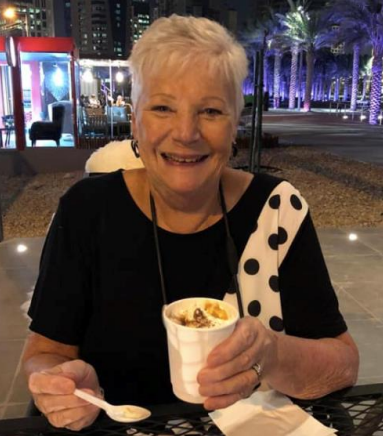
Heather Bovell respondent aged 72 in 2020 in Doha Qatar her home for most of the year
I was working with a number of people. It was the opportunity to travel. It was a qualification that was recognised worldwide. People say if you’re an accountant you must be very good at maths. My answer to that is no, you have to be numerate but communication skills are far more important than just mathematics. You met different people. I was lucky. I trained in a firm Cooper Bros, which is now P.W.C. in Glasgow. And the clients that we had were all mainly in manufacturing. Which of course is all gone. But my year would be Babcock & Wilcox, B.M.C., Albion Motors, Anderson Strathclyde the mining machinery manufacturers, British Steel and G.K.N. There were some smaller jobs when I was training.
Kenneth MacAldowie, born 1944, brought up in Aberdeen and Glasgow
I left school in 1958 and went to university in Glasgow and did a degree in chemistry. And after that in ’62, I went to Woods Hall Massachusetts for a year to an ocean science institute called the Woods Hall Oceanographic Institute. And spent year there. And then I came back to Glasgow because I was thinking I was going to be a school teacher. Then I went to Jordanhill College and spent three months discovering that I wasn’t cut out to be a school teacher (laughs) after all. So, I abandoned that and I went back to University and did a PhD in Glasgow in a subject that took me back to Woods Hall. After I finished my PhD, I went back to Woods Hall and spent the next thirty years actually working in ocean science in the Woods Hall Massachusetts on Cape Cod.
Hugh Livingston, born 1940, brought up in Hyndland and Fintry
From Hillhead I worked in Glasgow for ten years and then I came to Montreal when I was 26. Then I had to take a fundamental decision which most people are not fazed with and that is, ‘Do you turn left, or do you turn right?’ because I had no idea what a large city Montreal was. I actually thought Quebec city was larger than Montreal. But I found out that it’s probably a third less in size. Then I got a job here and had several jobs over the years. And age 40 I decided to, so-called, complete my education by going to Concordia University where I took a bachelor’s degree. And then I went on to McGill where I took a master’s degree. And then I came out and started a translation company which is called Rossion Inc. And it’s still going strong and getting stronger every day. It’s now being run by my daughter, who has an excellent team working with her to work on very significant large projects, as well as some smaller ones.
On the 3 rd July 1970, I got on a boat called ‘The Empress of Canada’ and seven days later, on 10th July 1970, I got off the boat in Montreal. And if you ask me “Do I miss Scotland?”, I will tell you I miss it every minute of every day. But now I have a wife, my children, my grandchildren. So in for a penny, in for a pound.
Peter McNaughton, born 1944, brought up in Clapham, Glasgow and Comrie
I was fifteen and I went into John Browns and the first year I was in the electrical drawing office. Like a kind of office boy. I quite enjoyed it, there was a good crowd in it. Believe it or not, even for that time, there were quite a few women in it. In the drawing office drawing up plans for electrical circuits and that. There weren’t a lot of women working in the shipyards, but in that section there was. Then about a year and a half after that I went on to the ships. Believe it or not I still remember, I’ll never forget it, it was The Salcetti.It was what you would call a beef boat and it went between Australia and New Zealand and then back to Britain carrying sheep or cattle, carcasses of meat. These were all fridge ships. The yard was tough really, you had no protective gear, and the noise was horrendous. We used to put cotton wool in our ears to help dull the noise because it was so severe. John Browns was old, old, antiquated stuff going away back to the Victorian times that they were using to build the ships. The toilet in the west yard, everybody used to call it the iron lung. And it was made of iron about quarter of an inch thick and it had holes in it. There were some men and they called them ‘The Hat Men.’ And when you went to get a cup of tea first thing in the morning in the old tins in the Riveters’ fire somebody would shout - Oh! Here’s the hat men coming (they all wore bowler hats they were managers) and you’d to run away. Occasionally they’d take pity on you. But a lot of the time they’d kick the cans to the floor. The conditions were terrible. It was a hard place to work, the shipyards. I was glad to get out for a while.
James McLaughlin, born 1939, brought up in Clydebank and Rothesay
My husband, he lived in Kelvinside, I met him at high school. I went to the Scottish College of Commerce for a year, and he went on to Glasgow University, and we ended up out here [Canada then the USA].
Winifred) Margaret Baker Davidson, born 1937, brought up in Glasgow and Fintry
Not very good wages, not very good conditions compared to now. And there was a lot, when you filled in a form, I remember that ‘What school did you go to?’ You had to put in your school and that was, “Aye, you’ve got the job”, or “No, you’ve not got the job”. There was a lot of that you know… I think generally there was plenty of jobs going then.
Cabreg, born 1935, brought up in London Road, Glasgow, and Pollok
I can remember no careers advice. But I was always going to be a teacher because everyone was teachers - my parents, my Grandfather, my Aunts. Everybody was either teachers or clergy in those days. Clergy wasn’t open to girls, so I was always going to be a teacher. And I was always going to be an English teacher because it was easy for me. I could read before I went to school you know. I could read when I was four. I can remember it… That’s also when I discovered I was synaesthetic; when I knew that 4 was purple and Wednesday was green. And my Mother said oh no, no Wednesday’s blue. And my sister thought she was peculiar because she didn’t know what we were talking about.
Christine McIntosh, born 1945, brought up Hyndland, Broomhill and Arran
You must be [encouraged on a career path], because you had what they called the ‘commercial class’, and all the girls were put into typing and shorthand. And all the boys were put into the woodwork. So they definitely did steer you that way.
Cecilia Murray, born 1942, brought up in Gorbals and Castlemilk
I worked in the telephone exchange and at that time it was part of the civil service. I remember going to an office and having to sit the Civil Service Exam. I worked there until I had my daughter. So, I worked there for about elevenyears and I didn’t go back to work again until after my son was twelve, around 1990. I worked three different jobs and then went to work for the council. So that was my working life. And I did retire when I was sixty-three.
Marion Penny, born 1940, brought up in Townhead and Ruchazie
I worked for British Rail as a Secretary. In British Railways you had to sit an exam before the company would hire them and I always seemed to do well in exams. And it was a Dumbarton girl that worked in the Human Services Department at British Railways. And she would go and visit my Mother when I was over here [the USA] just to see how she was doing. And she told my Mother that when I was hired, and I had got a first class pass in the test and I never knew that. When I worked there it was right behind the old Lewis’s building in St. Enoch Station. And the girl that would visit my Mother and another girl. I’m still friends with them to this day. And the last time I was back about thirteen years ago. And it was like we’d never left. We picked right up from where we left.
Rene Walters (nee Catherine McMenamin), born 1938, brought up in Dumbarton
When I left school, I went to Jordanhill college. But we’d led a very sheltered life in Old Kilpatrick. And I was at the stage… You know when you went out your day’s teaching? I felt a nervous wreck. I felt some the kids knew more than I did. They weren’t bigger than me. I had stretched a bit by that time. So, I actually left Jordanhill in the middle of my second year. I hated it and my father said-well leave if you don’t. So, I left and I got a job in an office in Glasgow as a clerk. In a…It was marine insurance. And I stayed there for about three years. And then I had a notion to go to London to try something different. So, I got a job with the GPO as a telephonist in the continental telephone service. And I worked in London. I trained as a telephonist in London. And then after about nine months it was shift work in the GPO. And I had been living with my aunt in Sussex and travelling. And when winter came on. You know there was fog and sometimes you never got home till as late. So, I moved into London and into a hostel for young ladies. And then quite a few of the folk that were telephonists along wi’ me-one of them had discovered an advert for the Independent Television Authority. And I was a bit sort of star struck. So, I thought that would be nice. You’d see all these stars. Course you didn’t. But I got the job and I worked with the ITA in Knightsbridge near Harrods for about a year. And then I began to…you know these folk that sometimes the way they talked to the telephonist. Sometimes you thought. You know, ‘Who do you think you’re talking to?’ When I had a summer holiday, I went back up to Jordanhill in the June. And I happened to meet the head man walking along the corridor. And I said to him I had left Jordanhill, but I would like to come back and finish my time there. So he looked at my record and said well you left of your own accord but remember you would need to start at the beginning of second year if you came back. Which I did and I started teaching in 1961. And again, after three years I began to get restless. And I was in Spain on holiday. I’d been to Benidorm the year before. And we went back, a friend and I, and we decided to cash in our ticket and stay extra time, and I got a job in a bar in Benidorm. This was in the early days when it was a wee quiet place. And when I came home that winter, I was teaching again but at the same time I was writing for various jobs in the travel world. So, I ended up opting out of teaching for about fifteen years.
Robertson Elma, Born 1936 brought up Old Kilpatrick
And then, finally got my graduate degree. And then my strangest transition of all was going from managing a shoe store to teaching at a university. And I remember going to my boss and saying, “I’m sorry, I gotta give you two-week’s notice.“ And he said, “Oh, is it money.” I said “No”. He said, “You know, we can manage a little more. We’ll match their offer.” I said “No”. He said, “Well, where you going?” I said, “I’m going to be teaching at the University of Lowell.” And he said, “I can’t beat that. “And I said, “No, you can’t beat that.” And I spent several years there teaching. And it was a great experience. I loved it. Then Massachusetts…We lived in Massachusetts at the time. The economy tanked. A whole bunch of things changed in Massachusetts. And I heard about a job down here. A friend from graduate school was working for the New Jersey Department for Environmental Protection. Came down, interviewed. Got a job. And I spent almost twenty-years cleaning up and making sure as environmental manager. Making sure environmental sites got cleaned up. And, kinda proud of that public service. And then I retired, and I started doing all the fun stuff.
Murdo Morrison, born 1950, brought in up Scotstoun and Drumchapel
At the time Ravenscraig was probably the biggest steelworks in Europe. Ravenscraig was an eye-opener. It was a long journey from Knightswood to Motherwell every day and back. I spent a year there working in a lab. I was a Trainee Metallurgist. It was interesting to say the least, but it was a dangerous place as well, a very dangerous place to work. But I suppose for a boy of sixteen/seventeen it was quite exciting as well. But the travelling just got too much. I then applied for a job in the Post Office as a telephone engineer and I spent the next few years working in telecoms engineering.
I did my apprenticeship with The Post Office in Glasgow. That was a two-year apprenticeship. You basically did six months in four different aspects of telephone engineering. After that, I stayed in telecoms but I moved to a private company, making and installing telephone equipment in telephone exchanges for The Post Office. And they were based down in England. So, I started working all over Scotland and England after that for a while. So I was never at home really in those days. I worked in Nottingham, Leeds, Wakefield, Stirling, Perth, all over in fact. I was a Tester Installer. In charge of testing all the equipment before it was handed over to The Post Office.
I enjoyed that, but not the sort of work for married men because you were never at home in those days. So, I moved from them to a company in East Kilbride. A big multinational company that was making telephone exchange equipment and I started in there as a Contracts Engineer, designing telephone exchanges, and from there I moved into the productions side of it. But then 3D came in and production came in and I could see the writing on the wall and went to night school.
I always blame it on Iain Cuthbertson of Sutherlands Law. I always wanted to be a procurator fiscal, but I never quite made it. I started up defending them rather than prosecuting them. I was a lawyer for about thirty years.” Graeme St Clair, born 1947, brought up in Knightswood and Springburn
Graeme St Clair, born 1947, brought up in Knightswood and Springburn
Well at that time it was 14, and then it went up to 15. My friend and I went round the shops and we got jobs in the city bakeries, Saturday jobs. My friend, she was able to start right away on the Saturday, but I had to wait until after the Easter holidays. I was able to work in the city bakeries during the Easter holidays, and then I was able to work on a Saturday after that. But I couldn’t work before that because of the age business.
There was plenty about here then. You fell into a job and if you didn’t like it, you could fall into another one. There were all these factories down in Vale of Leven. Westclox, Silk & Dye Factory, Burrows Adding Machine and the Distilleries. In Clydebank they had shipyards and Singers Sewing Machine Factory. Half of the area was employed in Singers. And then again there was retail and there was lots of big shops in Glasgow. There was no lack of work. If you weren’t working, it was because you didn’t want to.
Elma Robertson, born 1936, brought up Old Kilpatrick
I just think I’ve always been very lucky in managing to do what I wanted to do. And I’m a person who likes to get involved in a lot of things all my life.
I’ve kept my interest in the theatre and I was part of the group that started a theatre in Glasgow. The Tron Theatre.
My Mother didn’t work. None of her friends worked. Except for my best friend’s Mother who was an actress, but that’s not the same kind of thing. I suppose it became more of an expectation that people worked. I did get into trouble on leaving university when filling out a form. ‘What do you plan to do on leaving school or university’ and I put matrimony. I was in big trouble with the school because the expectation certainly was that well educated girls would get a job or go into a profession. And that was pretty soon after the end of the war.
Going to university for a Glasgow girl, going to school in Glasgow, was a big transition. Crossing town instead of just going up the road to school. But it was also the time when a lot of male students had come out of the army. There was a lot of support that they got to go to university. Masses and masses of ex-service people were there at that time. It was quite exciting because I’d been to an all-girls school. I knew some boys that were the sons of my parents’ friends’, but it was great. I enjoyed university. I don’t think I was ambitious. I just lived happily.
I have a lot of female grandchildren, thirteen of them and they’re all infinitely more ambitious than I ever was. And my two daughters were also more ambitious at that stage than I was, or my friends. I think we just enjoyed life.
I always wanted to work in a bookshop, and I went into a bookshop, Smiths, and asked for a job and I got it. So, I worked in the town bookshop. Then I worked in the university bookshop. I loved it; it was fun. I worked full time for about five years and then part time when I had my children. I missed the bookshop when I left but I left because I had other things to do. Mostly voluntary things. The Children’s’ Hearing System and various things that I got involved in.”
Helen Jean Millar, born 1931, brought up Pollokshields
